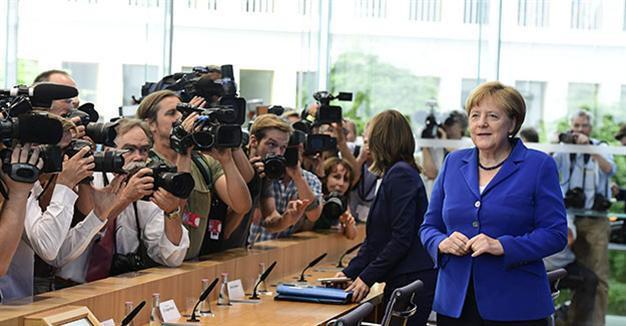Merkel defends refugee stance after attacks
BERLIN

German Chancellor Angela Merkel poses for the media as she arrives at a press conference in Berlin on July 28, 2016. AFP photo
German Chancellor Angela Merkel on July 28 rebuffed calls to reverse her welcoming stance toward refugees in the wake of a series of brutal attacks in the country.Merkel, who interrupted a summer holiday to face the media in Berlin, said the four assaults within a week were “shocking, oppressive and depressing” but not a sign that authorities had lost control.
The German leader said the assailants “wanted to undermine our sense of community, our openness and our willingness to help people in need,” as reported by AFP.
“We firmly reject this,” she said at a wide-ranging news conference.
Merkel repeated her rallying cry from last year when she opened the borders to people fleeing war and persecution, many from Syria, which brought nearly 1.1 million migrants and refugees to the country in 2015.
“I am still convinced today that ‘we can do it’ - it is our historic duty and this is a historic challenge in times of globalization,” she said.
“We have already achieved very, very much in the last 11 months.”
Merkel was speaking after an axe rampage, a shooting spree, a knife attack and a suicide bombing stunned Germany, leaving 13 dead, including three assailants, and dozens wounded.
Three of the four attackers were asylum seekers, and two of the assaults were claimed by the Islamic State of Iraq and the Levant (ISIL).
Merkel said that she would not allow jihadists, following a series of deadly attacks in France, Belgium, Turkey and the US state of Florida as well as Germany, to keep her government from being guided by reason and compassion.
“Despite the great unease these events inspire, fear can’t be the guide for political decisions,” she said. “It is my deep conviction that we cannot let our way of life be destroyed.”
The German attacks came with two state elections looming in September, in Berlin and in Merkel’s fiefdom of Mecklenburg-Western Pomerania, an economically depressed state on the Baltic coast.
The rightwing populist Alternative for Germany (AfD) party hopes to make a particularly strong showing there with a campaign against “Islamization”, which would deal Merkel a stinging blow one year ahead of a general election.
















